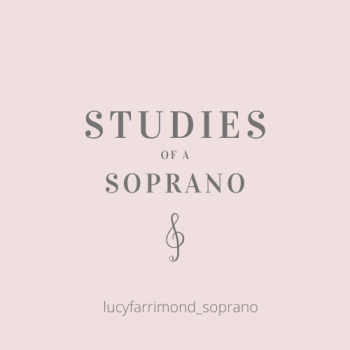Hello! Welcome to the ‘Studies of a Soprano’ blog. This blog will feature my top tips on how to prepare for a Conservatoire audition. Although these tips are aimed at conservatoire auditions in particular, the advice can be filtered into other areas of professional auditions. I do hope you find these tips useful!

- Prepare EARLY:
It is important to know that most UK conservatoire auditions take place each November and December, so you should keep this in mind prior to the application process to ensure you are fully prepared and thinking ahead. As soon as you receive your audition date, put it in the diary! I actually use a countdown app for important things such as auditions and assignment deadlines, so I would definitely recommend downloading something like this to remind you of how much time you have to prepare.
- Audition repertoire:
It is always a good idea to have a variety of repertoire on the go in your individual practice. Most conservatoires in the UK require at least three contrasting pieces at audition; one of which is usually an operatic and/or oratorio aria and the others being either French Mélodie, German Lied or English Song. The repertoire you need to prepare will vary for each institution, so I would recommend preparing a document and allocating your chosen repertoire to each institution clearly in a table. Make sure that you pick repertoire that you are comfortable with and that represents you and your voice at the stage that you are at now. Conservatoires are looking for potential and will know which direction your voice is taking – so don’t be tempted to sing a dramatic aria if you are not quite ready for it. Voices take time to develop and the panel know this. If you are unsure of what to sing, I would recommend speaking to your voice teacher. You can also get in touch with me via direct message and I would be happy to help with suggestions in any way I can.
- Perform as much as possible!
To make sure you are as confident as possible with your chosen repertoire – sing it to an audience as much as possible beforehand! This doesn’t have to be in an incredibly formal manner or on a grand stage – it can be to your parents at home in your living room! Just having the experience of walking into a room, taking a bow, introducing and singing your repertoire will help you prepare for the audition room and make the experience that little bit easier and more familiar when it comes.
- The dress code:
I remember vividly searching online for ideas and inspiration of what to wear for my undergraduate auditions. I also remember finding it very bizarre that most instrumentalists do not have to worry about this issue as it is common for them to audition in smart casual or concert dress! We are so often told as singers to dress up and be as glamorous as possible. If you love to do this, then by all means go for it – but I wouldn’t say that it’s completely necessary to wear a ball gown to an audition! When choosing an outfit, make sure you can breathe properly in it – and by this, I mean you should be able to do a deep and supported “singer” breath. In terms of the outfit – I don’t think you can go wrong as long as you stick to smart and sensible and you are comfortable. The only items of clothing I would be wary of are shoes. Can you walk confidently in them? Are they sturdy? You may feel brilliant in stilettos, but do you feel grounded and supported when you sing in them? I would definitely do a run through of your audition repertoire in your audition outfit beforehand to be on the safe side!
- Arrive ahead of time:
Make sure you arrive at the conservatoire early (even earlier than the advised time!). This is very important to prevent lateness from traffic jams or delayed public transport. The audition may be in a city that is new to you, so make sure you work out your directions in advance. Save yourself the stress and have that extra level of preparation. Having extra time at the conservatoire will help you get your bearings and calm down before registering and heading to your warm up room.
- The warm up:
Make the most of your warm up time and be sure not to ‘over’ warm up. It can be easy to do, especially if you are feeling a little bit nervous, but make sure not to overwork. Start warming up gently and vocalise until you are feeling happy, healthy and agile. You don’t want to overwork yourself and make your voice tired before heading into the audition room. I would advise also doing some stretches and breathing exercises. Not only will the breathing exercises help set your body up for performing, the regulation of breath will calm and focus you.
- Chat to the accompanist:
If you are using a conservatoire accompanist, in most cases you will only be allocated a short amount of time with them. Try to make the most of this time. Top and tail each of your pieces (without overdoing it) and be sure to point out the key moments in the piece where you have made a considerable artistic decision. This could be a fermata that is held extra long (show off those high notes!) or a rallentando that is exaggerated. Do not be afraid to voice your opinions here. Accompanists are highly talented and will follow your cue but they are not mind readers – if there is something you want doing in a very precise way – tell them!
- Relaxation Techniques:
It is completely normal to be nervous for an audition. I always try to think of it this way ‘being nervous just means that you care’ and nerves can actually be a good thing. In the past, to manage pre-audition nerves, I have practised mindfulness. If you are new to this, I would definitely recommend downloading the app ‘Headspace’ which is a great introduction for beginners. If you feel your heart starting to race, try to think of five things you can see, hear and feel and allow your mind to focus on those things instead of your nerves. Have a think about what makes you happy and relaxed. Do you like listening to music, or reading a book? I would recommend bringing a book with you or some headphones to listen to your favourite music whilst you are waiting. As we all know, the waiting part is always the hardest in these situations. Above all, remember that you have prepared and done your best and that is all anybody can ever ask of you!
- Be Yourself!
I cannot stress this point enough. Walk into that audition room confidently – as you. As tempting as it can be to listen to a singer you admire and emulate them as much as possible (we’ve all done it), the panel want to see an authentic performance. There is only one you and that is your unique selling point. Show them the true you, be honest and they will be sure to love you.
GOOD LUCK!
If you are a student who is considering auditioning to conservatoire, I do hope these tips help! If you have any questions, do drop me a message directly or leave a comment on this post!
The podcast version of this blog can be accessed via the following link: https://anchor.fm/studiesofasoprano/episodes/Vocal-Audition-Tips-etvn8d
Instagram: https://www.instagram.com/studiesofasoprano_/




